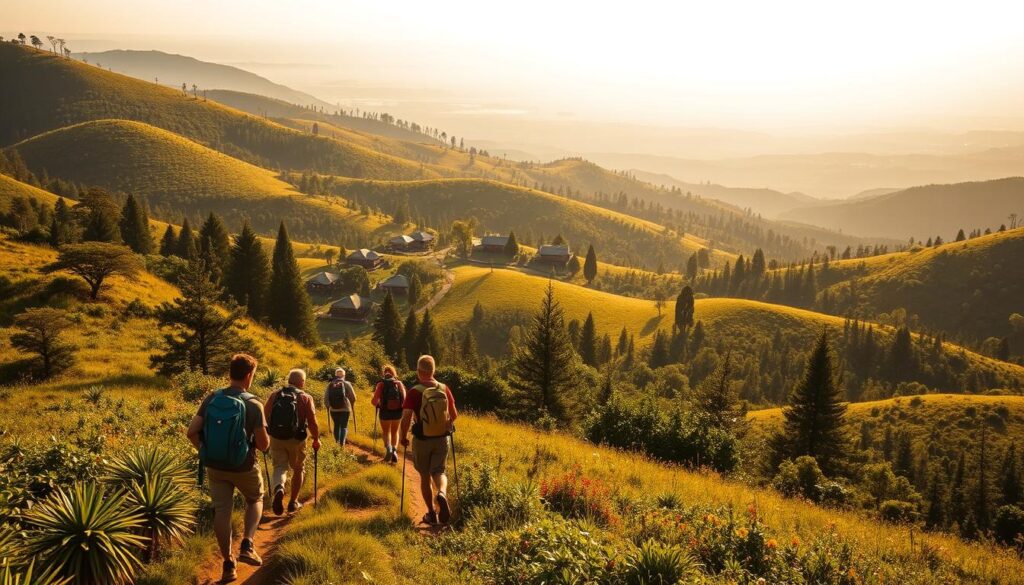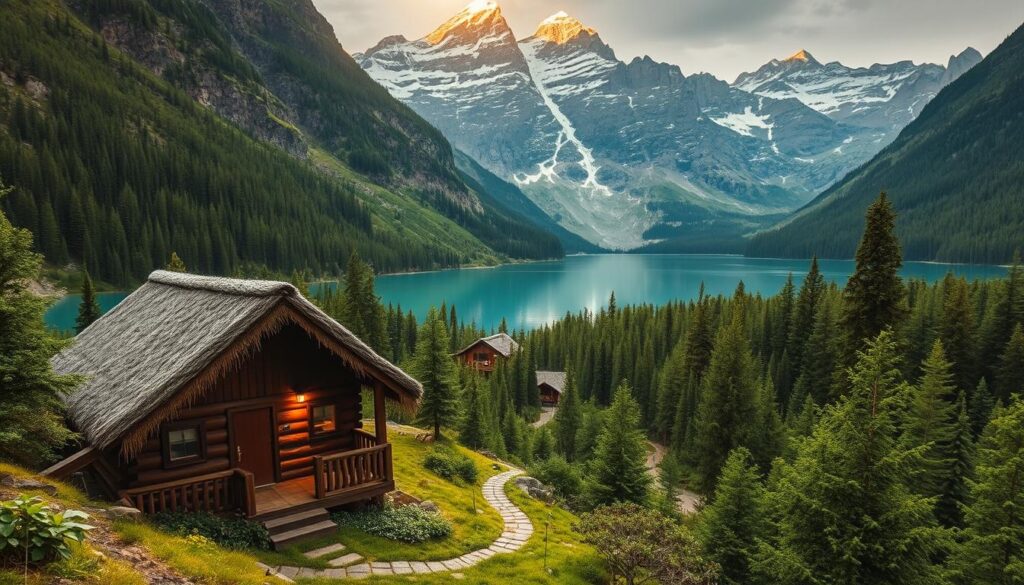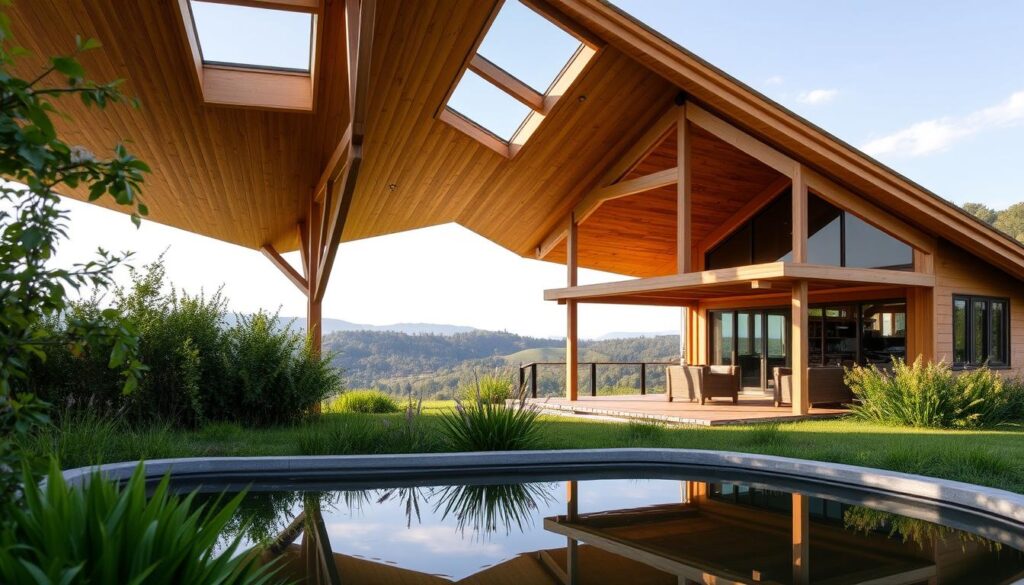Introduction
Eco-Lodges has achieved a 30% annual increase over the recent ten years. The modern traveler looks for nature exploration opportunities that reduce their environmental footprint thus numbers of Eco-Lodges continue to increase. The changing patterns in tourism created a new lodging category that has become known as the eco lodge.
Unlike traditional hotels, these Eco-Lodges combine luxury with a commitment to the planet. Eco-Lodges operate through renewable energy systems along with sustainable materials within innovative architectural designs intended to minimize their carbon emissions. The pleasant views from guest accommodations dual as evidence of sustainability investments.
Travelers find more than basic sleeping arrangements at the Volcanoes Safaris Eco-Lodges or the Dene Cottage along with other accommodations listed. These establishments remain actively involved in conservation-based work with local communities. Travelers who select Eco-Lodgesreceive environmental protection benefits and they promote sustained growth of regional economies.
This piece examines eco lodges by studying their architecture along with their specific locations and the remarkable encounters they provide to visitors. The next adventure awaits anyone who studies these stays to experience their revolutionary hospitality approach.
Key Takeaways
- The touristic industry of environmental conservation has expanded substantially as eco lodges emerged as the leading accommodations of choice.
- These lodges blend comfort with environmental conservation.
- The essential components in eco lodges include renewable energy systems together with sustainable materials usage.
- They use their resources to help develop both local populations and environmental preservation initiatives.
- The selection of an eco lodge produces positive effects for both natural environments and regional economies.
Introduction to Eco-Friendly Travel
Current travelers have transformed their world exploration methods. The rising concern about environmental problems drives people toward using eco-friendly options that protect natural ecosystems. People have developed ecotourism as a response to this shift which results from conservation-focused and cultural-sensitive travel practices.
What is Ecotourism?
The practice of ecotourism exceeds the conventional act of visiting natural areas. The approach links individuals to environmental exploration through sustainable practices which protect native residents. Traveling with an emphasis on education together with the practice of conservation and sustainable approaches defines this type of tourism. Tourists regularly become a part of activities that conserve wildlife as well as learning about traditional native cultures.
Numerous eco-friendly properties incorporate both waste reduction systems and employment of recycled materials in their operations. Such initiatives create spaces for tourists to maintain a beneficial footprint during their time spent at their destinations.
Benefits of Sustainable Accommodation
The selection of environmental-friendly accommodation provides numerous crucial advantages to guests. Natural energy systems and water supply systems form part of these environmentally conscious accommodation facilities. The selection of sustainable accommodation destinations enables guests to take part in protecting natural resources.
Tourists who choose Eco-Lodges facilities enable the growth of nearby communities. These accommodations maintain close cooperative ties with surrounding villages by providing employment opportunities together with cultural protection programs. Travelers can experience authenticity alongside economic development within the local communities by participating in this advantageous situation.
The essence of sustainable travel transcends accommodation choices since it focuses primarily on leaving behind a healthier world than people discovered before their journey.
People who adopt Eco-Lodges travel can combine meaningful interactions with nature with safeguarding initiatives which makes this travel style a meaningful exploration of the world. Such decisions provide positive effects for nature and the community members living there.

The Rise of Eco-Tourism and Sustainable Accommodations
At present the global travel industry shows a major transformation toward environmentally sensitive tourist practices. The preference for hotels and lodges that implement environmental practices became stronger among travelers because they want accommodations that suit their ecological ethics. The trend goes beyond decreasing carbon emissions to establish beneficial effects between nature and local populations.
Environmental and Economic Benefits
The dual advantages of eco-friendly tourism consist of environmental conservation and help for local economic growth. The Mara Serena Safari Lodge together with other establishments employs renewable power systems and efficient water conservation methods to achieve sustainability goals. Such practices help protect resources by saving them while attracting environmentally conscious guests.
Local communities also benefit. The ecological lodges link themselves with local communities to create employment opportunities along with cultural preservation initiatives. Pikaia Lodge in the Galápagos Islands joins forces with the local population to launch nature protection programs alongside earnings generation for tourism initiatives.
Changing Trends in Global Tourism
The tourism industry transforms because eco-tourism gains increasing popularity. Hotels in the present era use ecosystems including national parks and forests to create their structures. Guests can experience natural environments when they choose this travel method which simultaneously funds protection initiatives.
Traveled individuals have begun understanding how their movements affect the environment. Motorists at eco lodges can now attend teaching programs that emphasize area ecosystem knowledge together with preservation methods. A growing trend shows that responsible and adventurous tourism has become the new direction of the industry.
The eco-loving accommodation options now transform the way people discover the world by bringing them to both inaccessible islands and green forests. Placing bookings at hotels with these standards results in environmental wellness and benefits local communities.
Definition and fundamental characteristics explain the nature of Eco-Lodges
Travelers in this modern age are choosing accommodation options that focus on protecting the environment. Eco lodges differ from typical hotels through their eco-conscious design that reduces environmental effect together with their natural integrated experiences. The lodges implement modern sustainable approaches to minimize their environmental impact through specific carbon reduction techniques.
Sustainable Practices and Design Elements
Eco lodges establish themselves by embracing environmental construction approaches. Low-impact buildings are built using recycled wood and sustainable materials by various establishments. The building designs find natural integration with their surroundings through harmonious integration.
The main component of renewable energy forms a crucial part of such designs. Electricity production through solar power systems helps decrease dependence on fossil fuel energy. Efficient plumbing together with rainwater harvesting methods help to conserve the maximum amount of water.
Waste reduction is a priority. Responsible waste management is achieved through recycling programs and composting systems that lodges have implemented. The protective measures protect environmental stability while teaching hotel visitors about sustainable practices.
A lodge leaves behind no environmental marks
The hallmark of eco lodges includes such characteristics as innovative construction approaches. The modular building approach allows sites to become easily dismantled so they remain untouched. The lodges implement natural airflow systems and sunlight access features to minimize their utility requirements.
The selection of eco lodges promotes support for sustainability through efforts that protect natural habitats. Eco lodges provide attentive lodging options which combine convenience alongside environmental duties making them ideal places of accommodation for nature helpers.
| Feature | Traditional Hotels | Eco Lodges |
|---|---|---|
| Building Materials | Conventional materials | Recycled and sustainable materials |
| Energy Source | Fossil fuels | Solar and renewable energy |
| Waste Management | Standard disposal | Recycling and composting |
| Design Approach | Urban and modern | Low-impact and eco-friendly |
Spotlight: Eco-Lodges: Sustainable Accommodations Around the World
One can now experience responsible world exploration in ways that give immense rewards. Eco-mindful tourists have started to discover accommodations which offer VIP living in an environmentally conscious way. The resorts deliver extraordinary stays which benefit the local communities coupled with ecosystem conservation activities.
Eco lodges continue to produce substantial effects between the tropical Costa Rican rainforests and the Maldivian beachfronts. Visitors at Origins Lodge in Costa Rica can experience nature through wildlife tours while enjoying their meals at the organic farm dining setting. Gili Lankanfushi in the Maldives produces sustainable luxury through their overwater villas which run via solar energy.
Unique Guest Experiences
Visitors at these accommodations receive facilities beyond standard accommodation. Visitors at Volcanoes Safaris Eco Lodge get to experience gorilla observation while doing jungle trails in their wilderness habitat. Developing favorable relationships with nature becomes possible and builds enduring memories through these encounters.
Many lodges also focus on sustainable food initiatives. The resorts employ local produce in preparing sophisticated dishes that simultaneously help environmental sustainability by supporting regional farmers. Every food item at these facilities fulfills both culinary excellence and environmental preservation requirements.

Supporting Local Communities
Responsible tourism requires commitment to protect the environment as well as other aspects. Travel facilities that bring together local communities to maintain cultural traditions also generate employment opportunities. BrowserModule the staff at Gili Lankanfushi supports traditional Maldivian artisans to implement their designs across the hotel’s structure.
Tourism partnerships enable local residents to gain power which results in everybody benefiting from the sector. Travelers have the opportunity to participate in authentic cultural exchanges because the accommodations organize local tradition learning activities and craft demonstrations while staying at the facility.
A choice of eco lodges offers travelers the pleasure of magnificent scenery alongside real neighborhood encounters and supports the preservation of the environment. The facilities demonstrate that comfort and responsibility can exist together as true luxury elements.
The Principles of Ecotourism and Sustainability
The world of exploration is evolving through ecotourism because it unites exploration with ethical responsibility. Such an approach achieves dual benefits of environmental conservation with local community improvement. Eco-conscious stays achieve their mission of leaving positive effects by following key sustainability principles.
| Feature | Traditional Hotel | Eco Lodge |
|---|---|---|
| Guest Experience | Standard amenities | Wildlife encounters, cultural immersion |
| Food | Imported ingredients | Local, organic meals |
| Community Impact | Limited involvement | Job creation, cultural preservation |
| Environmental Practices | Basic recycling | Renewable energy, waste reduction |
Minimizing Environmental Impact
Ecotourism has reduction of environmental damage as one of its main objectives. The achievement of ecological objectives by lodges happens through their application of forward-thinking methods. The establishment utilizes solar power systems to produce electricity while collecting rainwater for water conservation purposes.
Waste management operates as an essential fundamental component. Environmental waste reduction happens through recycling projects and bio-waste recycling programs. The initiatives create both natural preservation area protection and educational programs about eco-friendly life approaches for guests.
Supporting Local Communities and Conservation
Ecotourism goes beyond environmental care. Additionally the initiative aims to give power to the local communities. The staff at accommodation facilities primarily come from local villages as part of their hiring process which leads to employment stability and promotes regional economic development.
Conservation efforts are equally important. The partnership between lodges and organizations results in combined efforts for wildlife protection and natural habitat restoration work. Community-funded anti-poaching programs together with forest regeneration projects receive financial support from these initiatives.
Use of Green Building Materials
The buildings that try to be environmentally friendly commonly utilize materials from recycling and from their local region. Bamboo and reclaimed wood materials remain popular because their usage helps decrease the demand for fresh natural resources. The materials modify the carbon output while maintaining natural design integration.
The modular building approach allows certain lodges to become dismantled for easy transport. The site’s preservation occurs through this method which protects the forest and biosphere reserve for future use.

Renewable Energy Solutions
The fundamental aspect of sustainable accommodation includes energy efficiency as its principle pillar. The installation of solar power systems in lodges allows them to operate independently from fossil fuels. These systems function alongside improved insulation components as well as natural ventilation technologies to decrease energy needs.
Water conservation stands as a main priority for our operations. Rainwater harvesting operates through systems which gather water for reuse purposes. The combination of proper plumbing systems with low-flow installation elements decreases water waste.
Perfect sustainable lodges eradicate all environmental impacts to maintain the land unblemished for upcoming generations.
Construction initiatives depend heavily on the involvement of local villages that live in the surrounding area. The involvement of neighboring residents helps lodges generate employment opportunities while encouraging people to protect the environment. Through joint efforts these places of tourism make positive contributions to both the resort facilities and the local region.
SustainableEco-Lodges operations now transform the guest hospitality industry through their prospective construction activities.
| Feature | Traditional Tourism | Ecotourism |
|---|---|---|
| Energy Use | Relies on fossil fuels | Uses renewable energy |
| Water Management | High consumption | Rainwater harvesting |
| Community Impact | Limited involvement | Creates jobs, supports culture |
| Conservation Efforts | Minimal | Funds wildlife protection |
Top Global Eco-Lodges Destinations
A worldwide movement of sustainability-minded travelers now explores attractive locations which unite deluxe facilities with nature stewardship standards. The hotels located in dense African jungles and peaceful Asian retreats combine memorable experiences with natural environment protection.
From African Jungles to Asian Retreats
Volcanoes Safaris Eco-Lodges presents its visitors with a distinct observation opportunity of the Bwindi Impenetrable Forest in Uganda. Forest trails lead hotel guests to observe gorillas living in their native forest area. The educational expedition provides wildlife encounter opportunities that strengthen conservation projects.
who choose Origins Eco-Lodges in Costa Rica find themselves within the verdant rainforest scenery. The hotel runs on solar energy while it also collects rainwater to reduce its influence on the environment. The hotel combines sustainable dining with nature tours to bring its visitors the best of lodging and ecological living.

Highlights of Unique Local Experiences
Wolwedans Dunes Lodge in Namibia rests at the center of Namib Desert territory. A sight of interminable terra firma hills stretches across an amazing vista. The hotel leads visitors into the area through facilitated hikes and cultural tours that introduce them to the native fauna and plant diversity.
Gili Lankanfushi in the Maldives provides Eco-Lodges overwater villas which generate energy through renewable sources. The island resort dedicated to marine conservation presents its visitors with opportunities for coral planting while offering snorkeling experiences. The place provides an ideal spot for water enthusiasts.
Tourists visiting Ecuador will find Mashpi Lodge situated within the cloud forest region. This hotel offers contemporary design alongside nature-friendly operating procedures. Guests who stay at this destination can discover the forest through both canopy tour experiences and wildlife observation outings to produce an exceptional travel experience.
Every best travel experience produces beneficial modifications in the lives of people and the environment.
These destinations showcase the best of eco-friendly tourism. People who choose these accommodations view spectacular landscapes and participate in meaningful experiences while backing environmentally focused programs together with local population support.
| Destination | Key Features | Guest Activities |
|---|---|---|
| Uganda | Gorilla trekking, forest immersion | Wildlife watching, cultural tours |
| Costa Rica | Rainforest setting, solar power | Guided tours, farm-to-table dining |
| Namibia | Desert views, eco-friendly design | Hiking, cultural experiences |
| Maldives | Overwater villas, marine conservation | Snorkeling, coral planting |
| Ecuador | Cloud forest, modern design | Canopy tours, wildlife spotting |
Eco-Lodge Experiences: Adventure, Wellness, and Luxury
Having a peaceful morning filled with natural sounds becomes possible when you spend the night in green forests which also provide exciting opportunities for adventure. More than basic accommodation these environmentally friendly resort hotels offer fantastic connectivity to nature with great luxuries built right in.
Outdoor Activities and Wildlife Encounters
People searching for exciting experiences typically use eco lodges as their pathway to remarkable discoveries. The accommodation staff leads guests along forest trails to waterfall discovery points while sharing knowledge about surrounding wildlife species. Nature-based activities enable visitors to see native animals personally because these experiences produce memories that persist forever.
Black Sheep Inn guests have the opportunity to experience bird-watching activities and cultural village tours in their nearby locations. The tour operators have created special routes which protect nature during the visit yet give visitors genuine cultural interactions.
Wellness and Relaxation in Nature
Total wellness serves as the foundation of environmentally friendly lodging. The spa services at lodges include local natural ingredients which staff uses to treat their guests. The natural setting at lodges provides conditions for yoga practice along with meditation opportunities to experience peaceful surroundings with their ambient sounds.
Forsyth Lodge, for example, combines wellness with environmental education. Guests have the chance to join sustainable living workshops and savor organic meals that stem from locally grown ingredients at the facilities. Participating in such experiences creates benefits for oneself while raising awareness about sustainable practices toward nature.



